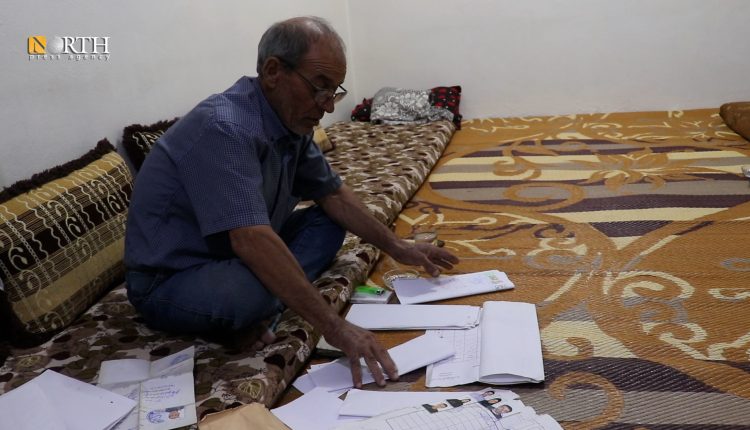
By Nalin Ali/Norman al-Abbas
QAMISHLI, Syria (North Press) – Since his birth six decades ago, Sabri has remained without official registration—stateless—after his father was stripped of Syrian citizenship following the exceptional census carried out in Hasakah Governorate, northeastern Syria, in the early 1960s.
Under the presidency of Nazim al-Qudsi, a one-day population census was conducted in Hasakah on Oct. 5, 1962.
Since then, the suffering of the “unregistered” category in northeastern Syria has continued. Thousands of Kurdish citizens were stripped of their civil rights, casting a long shadow over their lives and those of future generations.
No education, no employment
Ezeddine Sabri, 64, a resident of the city of Qamishli, says, “Since birth, I have been unregistered. This has been an injustice that touches every aspect of life. I could not go to school or complete my education because of it, and I could not work in government institutions either.”
Sabri explains that the 1962 census was unfair, as it lasted only one day, and his father was not present at the time—preventing him from being registered. In his local dialect, he adds, “It was like they were saying: ‘If you made it, fine. If not, you’re out.’ This issue caused me serious emotional and practical difficulties in life. Even my children were affected—they could not finish their education because schools were not open to the unregistered or to ‘foreigners.'”
Sabri also recounts the economic hardship he endured. “I did not even have a ration card, while my neighbors were able to buy subsidized goods at half the price or less. I had to pay double.”
He appeals to the Syrian transitional government, “Before the fall of Bashar al-Assad’s regime and up until today, I submitted all the required documents to obtain an ID, but they remain pending in Damascus. We hope the new government will finally do us justice.”
Racist project
Redwan Sido, General Coordinator of the Legal Office of the Kurdish National Council in Syria (ENKS), describes the 1962 census in Hasakah—implemented by Legislative Decree No. 93—as “one of several discriminatory measures aimed at targeting the Kurdish population in Syria.”
He notes that around 120,000 Syrian Kurds were stripped of their nationality as a result. Victims were divided into two categories. “Foreigners of Hasakah,” one category, were issued red identification cards showing they were not registered as Syrian Arabs, and thereby denied civil rights. The other category, “Unregistered (Maktumeen),” were not recorded in any official government registry whatsoever.
Sido adds that in 2011, with the onset of the Syrian revolution, former President Bashar al-Assad issued Legislative Decree No. 49, which granted nationality to the first group—foreigners—but the unregistered remained in limbo.
He calls for a legal solution today that includes “forming a judicial committee to grant citizenship to the unregistered and the remaining foreigners of Hasakah.”
Legal discrimination
Damascus-based Syrian lawyer, Lama al-Jamal, tells North Press that the 1962 decree, under which many Kurds were stripped of their nationality, constitutes a clear violation of citizenship rights.
She emphasizes that the practices following this decree breached the principles of the Universal Declaration of Human Rights, which states that everyone has the right to a nationality.
She explains that many groups, such as the unregistered and the foreigners of Hasakah, remain stateless and face both legal and social discrimination. They are denied fundamental civil rights.
Article 15 of the 1948 Universal Declaration of Human Rights affirms, “Everyone has the right to a nationality,” and “No one shall be arbitrarily deprived of his nationality nor denied the right to change his nationality.”
Al-Jamal further explains that individuals without official documents cannot enroll their children in school, sign employment contracts, own property, or even move freely due to the lack of a passport. Seeking asylum abroad is also impossible for them because they lack necessary documentation.
She also criticizes Legislative Decree No. 49 of 2011 as a failure to address the issues of the unregistered and foreigners of Hasakah.
Risk of statelessness
According to al-Jamal, the decree addressed only the status of the foreigners in Hasakah, completely ignoring the unregistered, thereby explicitly excluding them from any legal settlement.
She believes the lack of a clear legal mechanism to resolve the status of the unregistered has denied many the opportunity to acquire citizenship.
She also raises concerns about procedural discrimination, including the use of the number “8” on ID cards, which she describes as a form of bureaucratic bias.
Al-Jamal calls for the formation of a dedicated committee to review the consequences of the 1962 decree, analyze its impact, and design mechanisms to correct legal and administrative injustices—even decades after its issuance. She emphasizes the importance of issuing a fair new decree to regulate the naturalization of the unregistered and the foreigners of Hasakah.
In 2022, the organization Syrians for Truth and Justice published a report marking the 60th anniversary of the 1962 census. The report highlighted the persistent suffering of stateless Kurds and warned that the “risk of statelessness” now threatens a new generation of Syrian refugee children abroad.
According to 2018 statistics obtained by Syrians for Truth and Justice from a source within the Civil Affairs Directorate in Hasakah, the number of Syrian Kurds stripped of citizenship between 1962 and 2011 reached approximately 517,000 people. Of these, over 171,000 belonged to the unregistered category and were excluded from the provisions of Decree No. 49.
A recent conference for Kurdish unity held in Qamishli in late April reaffirmed the demand for restoring Syrian citizenship to Kurdish citizens stripped of it under the 1962 exceptional census.
The issue of the unregistered in Syria remains one of the most pressing human rights tragedies, as hundreds of thousands continue to live without legal identity or basic rights.
